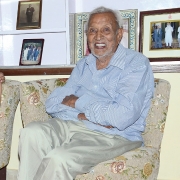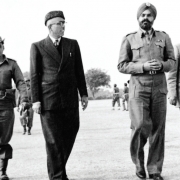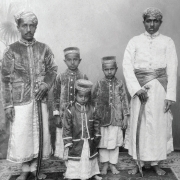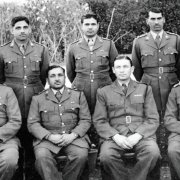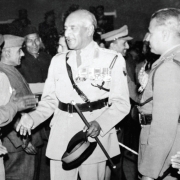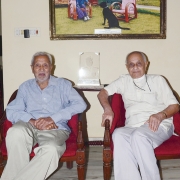
People
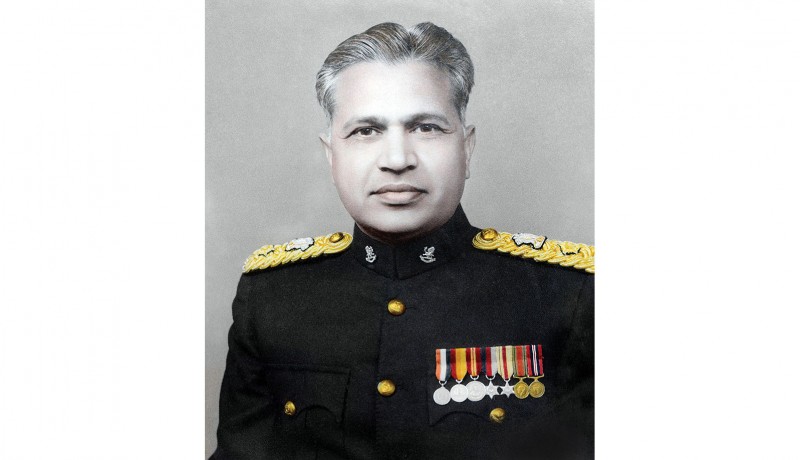
A centenarian looks back at life on the frontlines and regales Prakash Bhandari with tales from a distinguished career
Lt Col Ram Singh has a rather bold prescription for a long and healthy life—two pegs of whisky at sundown. As he pours a stiff Scotch into a cut-glass tumbler waiting patiently on a wooden side table, the former soldier dusts off his favourite memories and settles down to an evening of reminiscing. These days, he has plenty to toast, having celebrated his 100th year this April.
There’s another reason for his good cheer—it’s the 75th anniversary of the Battle of Al Alamein, which marked the culmination of the World War II’s North African campaign between the British and the German-Italian army. And our soldier was at centre-field, right where the action took place.
Seated in the drawing room in his son’s bungalow at Veer Vihar in Jaipur, Ram Singh points out that being a Rajput, valour runs in his blood. The son of a landlord, he was raised in Udaipur and like every other Rajput lad, he too dreamt of becoming an army officer one day.
These were times when the princely states in pre-Independent India maintained their own forces or ‘state forces’, which were largely ceremonial in nature. As a subject of the Mewar royalty, Ram Singh was expected to join the Mewar state forces but he dearly wanted to join the British Indian Army. “I wanted to join the regular British Indian Army because the scope of promotions was better and, as it was a regular army, the salary was better than in the state forces,” he shares.
In 1935, Ram Singh went to Dehradun to train as an officer of the Indian Army. When the ruler of Mewar Maharana Bhupal Singh learnt of this, he ordered the young soldier to return. Left with no choice, Ram Singh came back to Udaipur and became an officer of the Mewar state forces. He was commissioned in 1938.
When World War II broke out in 1939, the British administration dispatched the state forces of various principalities to fight in theatres of war across the world where the British were engaged in combat. A young, newly married Ram Singh thus found himself bound for El Alamein in Egypt, where the Mewar Infantry had been sent to battle against the Germans and Italians. His unit was part of the Allied Forces, and comprised British, Australians, New Zealanders, Indians and South Africans, as well as some French and Greek units. “I was asked to go to Egypt as the adjutant, which is a link between the commander and the soldiers. It was my job to carry the orders of the commander to the soldiers in the field,” he says, his memory sharp as a tack.
When Ram Singh arrived at Bombay port, he was overwhelmed. He was staring at a mammoth ship that would soon sail from Bombay to Suez, carrying a battalion of 1,000 soldiers of the Mewar state forces and another 1,000 soldiers of the British Indian Army. He recalls with boy-like wonder, “I come from Udaipur and had seen a number of lakes but this was the first time I had seen a ship and the ocean.” The ship with soldiers on it looked like a cantonment with arsenals and ammunitions loaded. It took one week to reach Suez and the journey was full of fun.
“It was exciting to mix with fellow officers and listen to the radio to know what was happening in different combat areas, including North Africa where [German] General Erwin Rommel’s Axis forces were giving the Allied Forces a tough time. After we reached Suez, we proceeded to Cairo by train, to our camp,” he remembers.
Ram Singh had never seen anything like this before. The war zone, 200 km from Cairo, had been cleared by the army, and civilians had been relocated from their villages en masse to makeshift camps near Cairo. Military trucks thundered menacingly on the roads, raising clouds of dust, while armed soldiers moved around, always on high alert.
They were in the midst of the Sahara desert; there was nothing else as far as the eye could see; and even drinking water had to be brought from far away. “The food was simple and very palatable as the Indian Army had its own cook. So we ate rice, chapattis, dal, meat and chicken. Life was very hard and the attacks from the enemy were frequent,” he recalls. The bravery of the Mewar forces was legendary but wars are not fought on valour alone. These soldiers, armed with rifles, machine guns and mortars, were ill-equipped for modern warfare and had to undergo weapon training, he says.
Finally, it was time to engage in combat and the unit was deployed on Ruweisat Ridge, on the eve of Operation Crusader. Our young officer and his unit took up position against the Afrika Corp commanded by Rommel. It was March 1941.
“For the first time, I was exposed to new warfare and I could see a number of armaments and arsenals I had not seen before. We had no idea that technology like this even existed. It was the first time I was looking at tanks and machine guns. We had not been trained to handle these new armaments and the German forces demolished us. We were forced to surrender a large territory to the Germans and a large number of personnel were killed. The Germans wanted to make deep inroads into Egypt for strategic purposes,” says Ram Singh. They used aircraft to drop bombs and the 7th armoured regiment of the Indian Army was defeated. But the Allied forces were well-trained and eventually pushed forth with double the tanks and troops as that of Rommel’s army. After ten days of fierce hammering, the Allies claimed victory, he says.
Ram Singh was lucky. Unlike around 150 soldiers from the Mewar forces, he escaped death. However, he had been injured by shrapnel and was shifted to an army hospital in Cyprus, where he recuperated for 45 days. During this time, he received a telegram bearing news of his father’s death.
He boarded a supply plane to Bombay and was given 10 days’ leave to go to Udaipur for his father’s funeral. However, three days later, the grieving soldier received a telegram from Egypt, ordering him to fly back to Cairo. He realised life in the army was not easy. “I remained in Cairo till the war ended in 1945 but I did not engage in combat again, as my unit was a part of the reserved forces.”
However, the battle-scarred soldier’s combat days were far from over. In 1948, Ram Singh was called upon, this time on home ground, as part of the police action in Hyderabad in 1948. He was part of the Mewar Infantry under the leadership of General Rajendra Singh, who later became chief of the Indian Army.
His next memorable posting was to Nagaland, during a rise in insurgency in the Northeastern hill state owing to the demand for statehood. There, he commanded the 3rd Assam Rifles and made many friends among the locals.
“I met a young Meghalayan woman who was in love with a young forest officer back then. As both of them were tribal Christians and belonged to different tribes, they were not allowed to marry, according to tradition. Their parents too were against the marriage. I loved Rose as a daughter, so I got some Christian friends to arrange a wedding ceremony in a church in Ranikhet, where the young couple got married,” recounts Ram Singh. Rose went on to become the first woman chairperson of the Union Public Service Commission and her husband retired as chief conservator of forests in Meghalaya. Unfortunately, she was unable to attend Ram Singh’s centenary celebration but wished him over the phone.
Ram Singh lost his wife Nand Kunwar in 1958, when he was posted in Delhi. Left to raise his sons on his own, he took early retirement at the age of 52 and settled in Ranikhet, now in Uttarakhand. He stayed here for almost five decades, till he moved to his son’s home in Jaipur.
It was in Ranikhet that Ram Singh met his second wife, Donna, daughter of India’s well-known pathologist Dr B M Trivedi, who also headed Delhi’s All India Institute of Medical Sciences. He was 65 and she was 40 when they decided to marry. “Both my sons welcomed this alliance but I had the misfortune that both my wives died young. This was my only tragedy in life; otherwise I have never had any worries.”
The ex-serviceman remains in perfect health although he walks with the support of a stick. He reads without glasses, and the doctors have told him something many seniors would love to hear: his blood pressure is under control and he no longer needs any medication! He attributes his longevity to “good inner feelings and the will to live long”. And, of course, there’s the tipple effect: “My two pegs of whisky at 7 pm are my lifeline and I enjoy them. It takes me an hour to finish them and this gives me enough pleasure.”
Photo: Zakir Hussain Featured in Harmony — Celebrate Age Magazine December 2017
you may also like to read
-
For the love of Sanskrit
During her 60s, if you had told Sushila A that she would be securing a doctorate in Sanskrit in the….
-
Style sensation
Meet Instagram star Moon Lin Cocking a snook at ageism, this nonagenarian Taiwanese woman is slaying street fashion like….
-
Beauty and her beast
Meet Instagram star Linda Rodin Most beauty and style influencers on Instagram hope to launch their beauty line someday…..
-
Cooking up a storm!
Meet Instagram star Shanthi Ramachandran In today’s web-fuelled world, you can now get recipes for your favourite dishes at….



